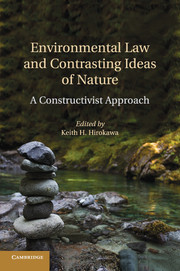
- Publisher:
- Cambridge University Press
- Online publication date:
- July 2014
- Print publication year:
- 2014
- Online ISBN:
- 9781139519762

Law's ideas of nature appear in different doctrinal and institutional settings, historical periods, and political dialogues. Nature underlies every behavior, contract, or form of wealth, and in this broad sense influences every instance of market transaction or governmental intervention. Recognizing that law has embedded discrete constructions of nature helps in understanding how humans value their relationship with nature. This book offers a scholarly examination of the manner in which nature is constructed through law, both in the 'hard' sense of directly regulating human activities that impact nature, and in the 'soft' manner in which law's ideas of nature influence and are influenced by behaviors, values, and priorities. Traditional accounts of the intersection between law and nature generally focus on environmental laws that protect wilderness. This book will build on the constructivist observation that when considered as a culturally contingent concept, 'nature' is a self-perpetuating and self-reinforcing social creation.
'Would nature exist without property law? … this is the kind of inquiry Keith Hirokawa and his collaborators … ask us to explore as a way of gaining deeper appreciation of law’s construction of nature as a human concept. Every chapter in this volume reminds us that nature is not the world without humans, it is a part of the world humans construct through law and other social institutions. … This collection of essays offers a bounty of fresh, innovative, and insightful expositions on that immensely important question. It will change the way you think law should think about nature.'
J. B. Ruhl - David Daniels Allen Distinguished Chair of Law, Vanderbilt University Law School
'By exploring how we construct and change nature by our laws, the contributors to this book demonstrate the importance of new policy debates and the need for changing our constructs, especially in a climate altered world. To have a new way of looking at the world, we have to understand how we got where we are. This book does this beautifully.'
Victor B. Flatt - Director, Center for Law, Environment, Adaptation, and Resource, University of North Carolina
 Loading metrics...
Loading metrics...
* Views captured on Cambridge Core between #date#. This data will be updated every 24 hours.
Usage data cannot currently be displayed.